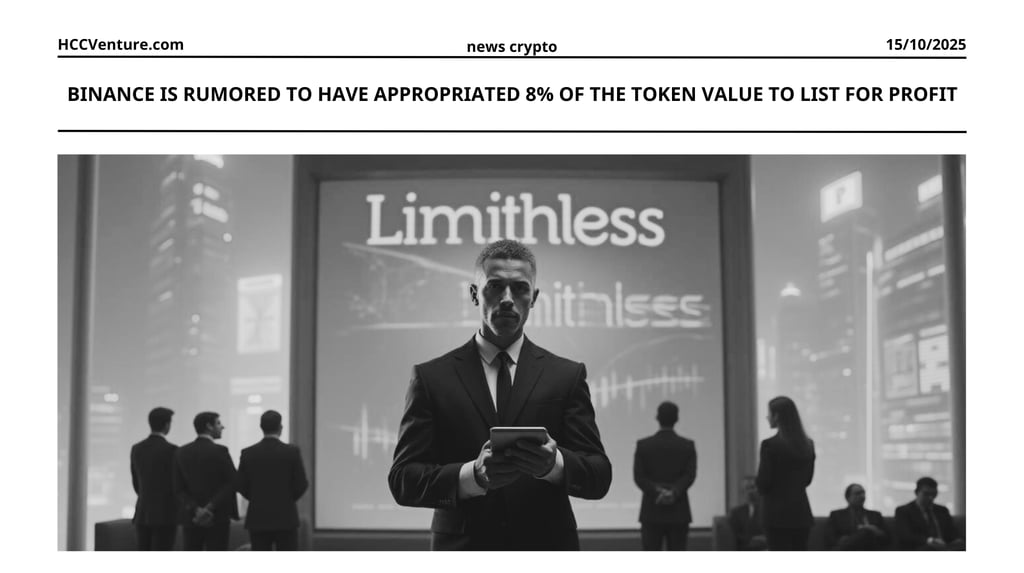Binance is rumored to have appropriated 8% of the token value to list for profit
Blog post description.The CEO of Limitless Labs has made shocking allegations against Binance, as the giant demanded an 8% stake in his project's new token in exchange for a coveted listing.
10/15/20252 min read


Power from listing
Token listings are one of the most influential — and shady — aspects of the cryptocurrency ecosystem. Listings on Binance often result in massive liquidity, retail exposure, and price discovery, instantly catapulting a project into the global spotlight. This influence has made Binance’s listing process both coveted and controversial.
Limitless Labs' CEO alleges that during discussions about a potential listing, Binance representatives requested an 8% cut in the total token supply — either directly or through affiliated wallets — as a “ condition for listing .”
If accurate, this would be a significant and unusual request, far beyond the standard 0.5%–2% range typically allocated to liquidity provision, marketing, or exchange partnership groups.
Hetherington's shocking revelation
Hetherington, the outspoken founder of Limitless Labs—a DeFi protocol that combines AI-based yield farming with tokenized real-world assets—made waves late Wednesday, posting a redacted “offer” from Binance’s listing team. The document reportedly outlined the requirements for the $LMT token launch. Allocation of 8% of the total supply (worth about $20 million at projected input value), a $5 million USDT security deposit, and ongoing “marketing commitments” tied to performance metrics.
“ This is how they ‘claim’ value from projects ,” Hetherington fumed, linking this to broader complaints about “ listing taxes ” on CEXs, which are stifling innovation. Just days after Binance bailed out a $283 million depeg and amid a reported $21.75 billion in outflows, these claims add to stories of exchange abuse.
Big Impact on Binance
The crypto community was quick to react, with industry leaders and analysts calling for complete transparency in negotiations between exchanges and projects. Critics say such practices — if proven true — blur the line between market making and conflicts of interest, effectively allowing exchanges to profit directly from the tokens they list.
Several prominent figures, including DeFi founders and venture capital partners, have echoed the view that “listing stake” should never be a hidden fee, calling on exchanges to publicly disclose all economic interests in listed assets to restore credibility in the market.
Binance, already under pressure from global regulators, is facing new concerns about its internal governance and listing protocols. In recent months, Binance has sought to rebuild its reputation through public audits, leadership restructuring, and compliance initiatives. However, allegations of opaque listing arrangements could undermine these efforts — especially if regulators view token allocations as a form of undisclosed compensation or market manipulation.
This controversy could spur an industry-wide shift toward decentralized and transparent listing mechanisms, such as on-chain listing voting or DAO-managed integration processes. It also reinforces calls for independent oversight of exchange holdings, including verifiable audits of exchange-owned wallets versus project-related allocations.
Disclaimer: The information presented in this article is the author's personal opinion in the cryptocurrency field. It is not intended to be financial or investment advice. Any investment decision should be based on careful consideration of your personal portfolio and risk tolerance. The views expressed in this article do not represent the official position of the platform. We recommend that readers conduct their own research and consult with a professional before making any investment decisions.
Explore HCCVenture group
HCCVenture © 2023. All rights reserved.


Connect with us
Popular content
Contact to us
E-mail : sp_contact@hccventure.com
Register : https://linktr.ee/holdcoincventure
Disclaimer: The information on this website is for informational purposes only and should not be considered investment advice. We are not responsible for any risks or losses arising from investment decisions based on the content here.


TERMS AND CONDITIONS • CUSTOMER PROTECTION POLICY
ANALYTICAL AND NEWS CONTENT IS COMPILED AND PROVIDED BY EXPERTS IN THE FIELD OF DIGITAL FINANCE AND BLOCKCHAIN BELONGING TO HCCVENTURE ORGANIZATION, INCLUDING OWNERSHIP OF THE CONTENT.
RESPONSIBLE FOR MANAGING ALL CONTENT AND ANALYSIS: HCCVENTURE FOUNDER - TRUONG MINH HUY
Read warnings about scams and phishing emails — REPORT A PROBLEM WITH OUR SITE.
